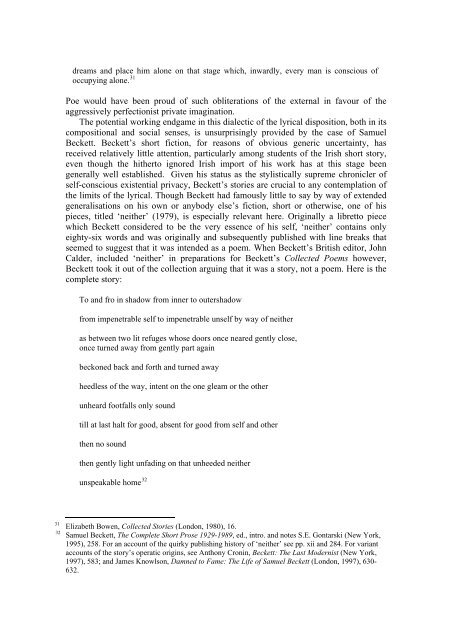Inside Out: A Working Theory of the Irish Short Story. John Kenny
Inside Out: A Working Theory of the Irish Short Story. John Kenny
Inside Out: A Working Theory of the Irish Short Story. John Kenny
You also want an ePaper? Increase the reach of your titles
YUMPU automatically turns print PDFs into web optimized ePapers that Google loves.
dreams and place him alone on that stage which, inwardly, every man is conscious <strong>of</strong><br />
occupying alone. 31<br />
Poe would have been proud <strong>of</strong> such obliterations <strong>of</strong> <strong>the</strong> external in favour <strong>of</strong> <strong>the</strong><br />
aggressively perfectionist private imagination.<br />
The potential working endgame in this dialectic <strong>of</strong> <strong>the</strong> lyrical disposition, both in its<br />
compositional and social senses, is unsurprisingly provided by <strong>the</strong> case <strong>of</strong> Samuel<br />
Beckett. Beckett’s short fiction, for reasons <strong>of</strong> obvious generic uncertainty, has<br />
received relatively little attention, particularly among students <strong>of</strong> <strong>the</strong> <strong>Irish</strong> short story,<br />
even though <strong>the</strong> hi<strong>the</strong>rto ignored <strong>Irish</strong> import <strong>of</strong> his work has at this stage been<br />
generally well established. Given his status as <strong>the</strong> stylistically supreme chronicler <strong>of</strong><br />
self-conscious existential privacy, Beckett’s stories are crucial to any contemplation <strong>of</strong><br />
<strong>the</strong> limits <strong>of</strong> <strong>the</strong> lyrical. Though Beckett had famously little to say by way <strong>of</strong> extended<br />
generalisations on his own or anybody else’s fiction, short or o<strong>the</strong>rwise, one <strong>of</strong> his<br />
pieces, titled ‘nei<strong>the</strong>r’ (1979), is especially relevant here. Originally a libretto piece<br />
which Beckett considered to be <strong>the</strong> very essence <strong>of</strong> his self, ‘nei<strong>the</strong>r’ contains only<br />
eighty-six words and was originally and subsequently published with line breaks that<br />
seemed to suggest that it was intended as a poem. When Beckett’s British editor, <strong>John</strong><br />
Calder, included ‘nei<strong>the</strong>r’ in preparations for Beckett’s Collected Poems however,<br />
Beckett took it out <strong>of</strong> <strong>the</strong> collection arguing that it was a story, not a poem. Here is <strong>the</strong><br />
complete story:<br />
To and fro in shadow from inner to outershadow<br />
from impenetrable self to impenetrable unself by way <strong>of</strong> nei<strong>the</strong>r<br />
as between two lit refuges whose doors once neared gently close,<br />
once turned away from gently part again<br />
beckoned back and forth and turned away<br />
heedless <strong>of</strong> <strong>the</strong> way, intent on <strong>the</strong> one gleam or <strong>the</strong> o<strong>the</strong>r<br />
unheard footfalls only sound<br />
till at last halt for good, absent for good from self and o<strong>the</strong>r<br />
<strong>the</strong>n no sound<br />
<strong>the</strong>n gently light unfading on that unheeded nei<strong>the</strong>r<br />
unspeakable home 32<br />
31 Elizabeth Bowen, Collected Stories (London, 1980), 16.<br />
32 Samuel Beckett, The Complete <strong>Short</strong> Prose 1929-1989, ed., intro. and notes S.E. Gontarski (New York,<br />
1995), 258. For an account <strong>of</strong> <strong>the</strong> quirky publishing history <strong>of</strong> ‘nei<strong>the</strong>r’ see pp. xii and 284. For variant<br />
accounts <strong>of</strong> <strong>the</strong> story’s operatic origins, see Anthony Cronin, Beckett: The Last Modernist (New York,<br />
1997), 583; and James Knowlson, Damned to Fame: The Life <strong>of</strong> Samuel Beckett (London, 1997), 630-<br />
632.

















